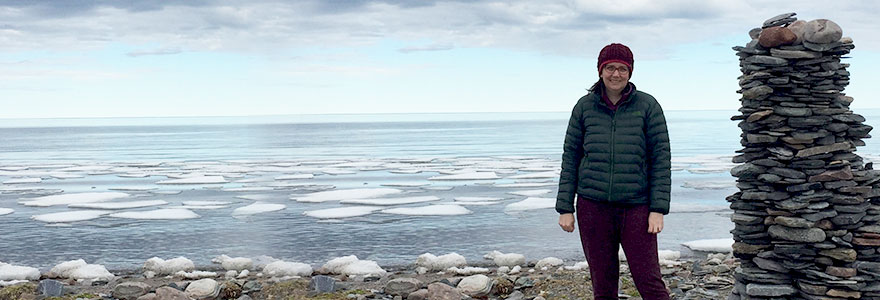
Brenda Mercer

Brenda Mercer
Brenda Mercer, a Doctor of Education graduate, is using her Organizational Improvement Plan (OIP) to help teachers reconnect with Inuit values using Inuit Qaujimajatuqangit (IQ).
The Learning Coach from Nunavut Territory said IQ builds relationships that helps schools create good learning environments, allowing students to flourish.
“The relationships teachers develop with their students is way more important than the knowledge base of the curriculum,” said Mercer.
Inuit Elders developed IQ and it has eight principles:
Mercer said these IQ values become part of the education system when teachers live these values.
“Through this values-driven society, we’re able to improve schools,” said Mercer.
The Doctor of Education program – Study anywhere in the world
Putting theory into practice and studying online were the reasons Brenda Mercer applied to the program.
“When you have teachers living remotely and still completing a doctorate degree, it’s an amazing experience,” said Mercer. “You can raise a family and be a professional while completing a doctorate degree even when you’re in the most remote region of Canada.”
What’s more, IQ will help educators in Nunavut face challenges that are unique to the territory. Mercer said the territory’s remote location makes it difficult for students to find jobs when they graduate or further their education. Residents have to leave the community for these opportunities.
In particular, the education system is dealing with its colonial past and there aren’t enough Inuit teachers in school. This has led the Indigenous population to lose their language. Teacher turnover is also a problem, said Mercer.
“We’re remote and we’re isolated. It’s a $2,000 flight to Winnipeg,” she said. “The longer you can keep teachers in the community and in the schools, the longer you can limit turnover in leadership, and the more capacity schools build and more connections they make with the community, the better outcomes you realize.”
She added Nunavut also faces the same challenges other parts of the country face, such as poverty and homelessness.
Mercer’s OIP examined how Learning Coaches can help staff and teachers work together to improve how students learn to read and write. Her plan recommends using Inuit values to improve how Learning Coaches can support teachers to make connections with their students.
Working with her Superintendent of Schools, Sonia Osborne, also a Doctor of Education student at Western, Mercer is expanding her literacy initiative to look at all-types of teacher needs throughout the district.
Recently Mercer has collaborated with leaders in her region to develop a workshop for principals and learning coaches. They learned how to have conversations with their teachers that value their expertise while acknowledging the importance of IQ in the education system.
“Ideally, you’re developing capacity in your schools and making those strong community connections so people can buy into education.”